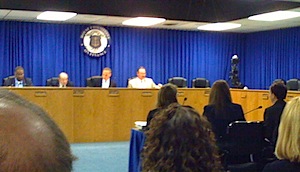Statement by Comm. Gist on the funding formula, translated
By John McDaid | Saturday, 12 June 2010The flacks at RIDE moved a statement from the Commissioner yesterday afternoon, responding to Thursday night's passage of the education funding bill by the general assembly. Fisking is rarely the first club out of the bag for me, but in this case, I thought a bit of an interlinear translation might be in order...
| N E W S R E L E A S E Statement from Commissioner Gist on the new funding formula for aid to education: |
Wonder if she sent this to Time Magazine... |
| The funding formula that the General Assembly approved last night (June 10, 2010) will meet the needs of Rhode Island students. Because it takes into account student need and district capacity, it will be fair to all school systems. It will provide adequate funding to educate all students in our state. | At $3,000 less than any school district actually pays to put kids in a classroom, the $8,295 foundation amount will not, res ipsa loquitur, meet the needs of our students, and that's before they apply the magic formula to reduce this (by 87%, in Portsmouth's case).
And for districts — like, say, Portsmouth — which are operating efficiently yet stand to lose $2.07M, this is not fair, nor is it adequate. Fair does not just mean fair to some, nor fair to a different set of winners and punishing those who were allegedly overfunded. Fair means fair to all. |
| Supporting student achievement is our highest priority. A transparent, consistent education funding formula will allow us to ensure that student achievement remains the top priority for our state and for every school district. | Because RIDE started with a revenue-neutral approach, it could not, by definition, make student achievement the top priority. And if achievement is important for *all* students, the blunt instrument of a 40% Free and Reduce Price Lunch multiplier is deeply suspect. Is it RIDE's position that ALL English Language Learners are on reduced price lunch? Really?
As someone who took the time to figure out how the quadratic mean actually works, let me just say that if this formula is what passes for transparency, I might resubmit my application to join the PCC. |
| The new funding formula allocates resources fairly. It includes an innovative transition plan so that local districts have time to adjust to the revised distribution of funds. It will phase in the changes in funding allocations over 10 years. | In case you didn't hear us two paragraphs up where we said this is fair, we're going to say it again. HEY YOU WHINERS IN THE EAST BAY! THIS IS FAIR!
For communities like Portsmouth, it doesn't matter how long you take to cut $2.1M from our schools; you're still driving them into deficit. That's like telling someone, hey, I'm going to chop off your hand really slowly so you have time to adjust. I wonder if the Commissioner remembers when she came to Rep. Amy Rice's regionalization commission meeting and promised to support any changes to S3050 that were needed to help districts cope with funding cuts. What happened to that promise? There wasn't any 3050 relief in the bill, and the sponsor, Rep. Costantino, spoke against Rice's attempted amendment on the floor. So did Costantino double cross Gist, or did the Commissioner just not have enough juice to make this happen? And a word about bragging. It's perfectly okay for someone *else* to call your transition plan innovative, but personally, I'd be careful about using this word self-referentially, unless you're writing a résumé. Uh, this isn't a résumé, is it? N.B. Taking the Ajello plan and stretching the timeline is an incremental improvement, not an innovation. |
| This funding formula is based on the principle that the money will follow the student. It is a dynamic system that will redistribute allocations as enrollment patterns change. We are confident that this funding formula will take us from being the only state without a funding formula to being the state with the best funding formula in the country. I am very pleased that the General Assembly has taken this historic step, which will help us to invest our education resources wisely and to transform education in Rhode Island. | This talking point about money following the student is the Big Lie. Let's take a student in Providence where the state is picking up 85% of the "cost" or $7,050. Now, let's assume this student's family moves to Portsmouth, where the state contributes 13% or $1,078. Tell me, Commissioner, exactly *how* is the money is following the student? |
| - Deborah A. Gist, Commissioner of Elementary and Secondary Education | Gotta hand it to the Commissioner for a press release like this. That last paragraph? Wow. Big brass ones. |

